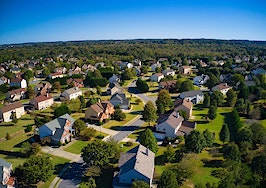Home prices saw their highest ever recorded increase in 2021, according to data released Tuesday from CoreLogic.
Prices increased 18.8 percent year over year in 2021, the biggest increase seen in the 34-year history of the S&P CoreLogic Case-Shiller Index, and a huge jump from 2020 when home prices increased only 10.4 percent.
“This is the highest calendar-year increase in 34 years of data and substantially ahead of 2020s 10.4 percent gain,” Craig Lazzara, managing director at S&P DJI, said in a statement.
Price growth stalled at 18.8 percent month to month, while the S&P 20 city composite, which tracks price growth in 20 major American cities, charted an 18.6 percent gain, up from 18.3 percent the previous month.
“We continue to see very strong growth at the city level,” Lazzara said. “All 20 cities saw price increases in 2021, and prices in all 20 are at their all-time highs.”
Phoenix led the 20-city composite with a 32.5 percent increase in home prices year over year. The city was followed by fellow sun-belt locales Tampa, Florida, logging a 29.4 percent increase and Miami clocking in at 27.3 percent.

S&P CoreLogic
The latter half of 2021 saw rates consistently increase year over year but at a decelerating rate compared to the beginning of the year when they shot up dramatically. December marked a pause on that deceleration as rates remained steady, with some buyers rushing to close on homes before interest rates rose further. Some experts predict prices will eventually start to dip as rates continue to rise.
“Buyers may have been rushing in anticipation of higher rates, though most recent data suggests that demand remains vigorous despite the 100 basis point increase in rates,” Selma Hepp, deputy chief economist at CoreLogic, said in a statement. “However, as rates continue to pick up, budget-constrained buyers will face more challenges, likely leading to some waning demand.”
The dramatic home price growth in the United States has been driven in part by low mortgage rates over the past two years, along with a push to relocate amid remote work pushing up prices in newly popular markets that don’t have the housing supply to handle the influx.
“More data will be required to understand whether this demand surge simply represents an acceleration of purchases that would have occurred over the next several years rather than a more permanent secular change,” said Lazzara. “In the short term, meanwhile, we should soon begin to see the impact of increasing mortgage rates on home prices.”
Also on Tuesday, the Federal Housing Finance Agency released its own dataset that charted home prices as rising 17.5 percent in 2021, with a 3.3 percent increase in the fourth quarter.













